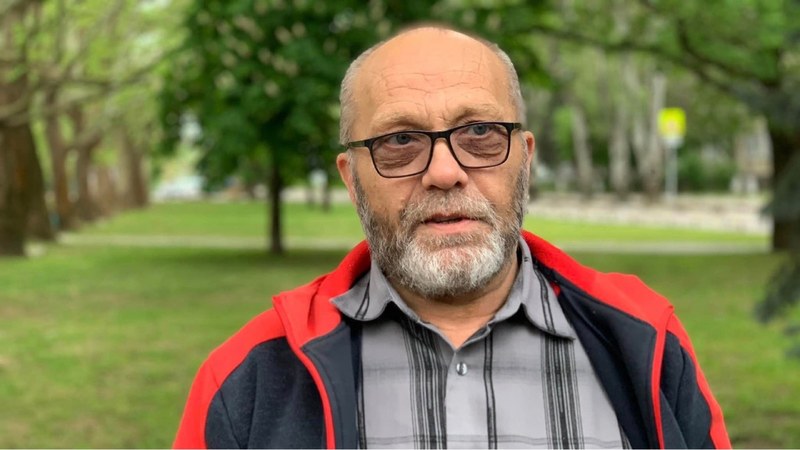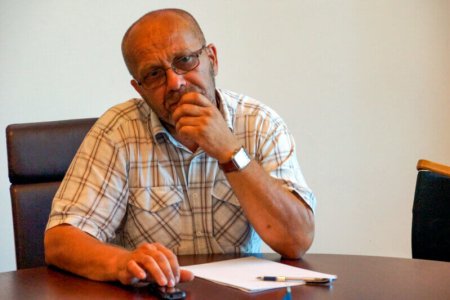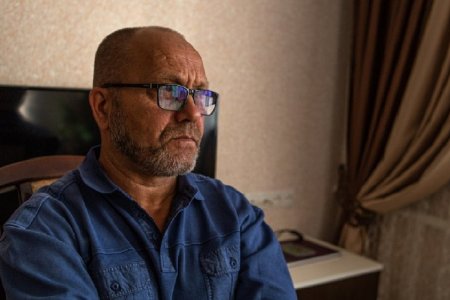
Less than a month after Abdureshit Dzhepparov was jailed for 12 days on an absurd pretext, Russia has come up with two new charges against the renowned veteran of the Crimean Tatar national movement and human rights defender. He is accused of ‘discrediting the Russian armed forces’ over material that had nothing to do with him, as well as with ‘abusing freedom of mass information’, a particularly curious charge given that Russia has eliminated all media freedom in occupied Crimea.
Crimean Solidarity reports that the charges have been laid by Russia’s so-called ‘centre for countering extremism’ in occupied Crimea. According to Roman Filatov from this centre, the charge of ‘discrediting the use of the Russian Federation’s armed forces) under Article 20.3.3 § 1 of Russia’s code of administrative offences is over the Facebook page of the civic organization Qırım Gayesi [Crimean Idea]. Filatov claims that Dzhepparov administered this Facebook page and that he “circulated knowingly false publicly significant information under the guise of true messages.” He is also asserted to have “expressed his disagreement with the actions of the Russian Federation armed forces” in what Russia continues to call its ‘special military operation’ against Ukraine. There is no separate information about the charge of ‘abusing freedom of mass information’ (Article 13.15 of the same code) so it seems likely that both charges pertain to material on the Qırım Gayesi page.
The texts in question include posts about the armed search of Dzhepparov’s home and his arrest, other acts of persecution, as well as about Ukrainian citizens, including children, being moved to occupied Crimea. Filatov does apparently say that “Dzhepparov’s actions do not contain elements of criminally punishable acts,”
They were also not his actions. Dzhepparov himself explains that, while he is one of the founders of Quirm Gayesi, he has nothing to do with the publications on the Facebook page and is certainly not the administrator. As Quirm Gayesi itself noted, it was simple enough to see that the officers were mistaken, since, during the period when he was imprisoned, there had been news on their page both about Dzhepparov’s persecution, and about other human rights violations in Crimea. “It is clear that this is merely a form of pressure on our group, when we’re confronted with the choice – to be silent about all the numerous human rights violations and war crimes, or to sacrifice the liberty of a person respected in society and the inspirer of this initiative who has by today ended up the virtual hostage of the Russian security.”
The new ‘court’ summonses were presented to Dzhepparov after he spent 12 days in jail on the previous administrative charge. The new hearings are scheduled at the occupation ‘Kievsky district court’ in Simferopol on 13 and 14 June.
As reported, Dzhepparov, his wife and 14-year-old daughter were awoken early on 25 April when armed and masked FSB and other enforcement officers burst into their home. They seized Dzhepparov himself, and also took all telephones away, to prevent them from ringing lawyers and human rights activists. The officers’ only response when Niara Abdurayimova asked why they had seized her husband was ‘extremism’.
Dzhepparov was taken away, and it was late evening before lawyer Edem Semedlyaev was finally told that he was being held in a temporary holding unit. Semedlyaev was only allowed to see Dzhepparov the following morning, and learned then that a supposed ‘court hearing’ had taken place the previous day [at the occupation ‘Bilohirsk district court’] while the FSB and police were claiming to know nothing about his whereabouts. With no attempt made to explain why armed officers had turned up at Dzhepparov’s home at all, the police claimed that Dzhepparov had “shown resistance” when they took away his computer. This nonsense was used as the pretext for an administrative charge under Article 19.3 of Russia’s Code of administrative offences and for the ‘court’s imposition of a 12-day term of imprisonment.
This new act of repression came just over a year after the raid carried out on 16 March 2022 by Ruslan Shambazov, the notorious head of Russia’s so-called ‘centre for countering extremism’, and his henchmen. They took Dzhepparov away, and also detained his two nephews, Fevzi Yakubov and Mukhammed Ali Dzhepparov. As has become the illegal norm in occupied Crimea, Dzhepparov’s lawyer Emine Avamileva was prevented not only from being present during the ‘inspection’, but also from seeing her client in the police station.
On that occasion, Dzhepparov was charged over a video clip posted over two years earlier on social media. The song on the clip compared a Soviet march with the Nazis. Although this was very clearly an unfavourable comparison, the song was used as a pretext for bringing charges against Dzhepparov under Article 20.3 § 1 (‘propaganda or the public demonstration of Nazi symbols, or those of extremist organizations’). He was jailed then for 15 days.
Abdureshit Dzhepparov and his family have already experienced the terror Russia brought to occupied Crimea. On 27 September 2014, the couple’s elder son Islyam Dzhepparov, who was just 19, and his 23-year-old cousin Dzhavdet Islyamov were seized by masked men wearing black uniforms, forced into their Volkswagen minivan and taken away. Despite the testimony of witnesses and the fact that even the registration number was known, the occupation authorities made little or no effort to find either the two young men, or their abductors.
Although by far the most brazen, this was not the only abduction / enforced disappearance during the second half of 2014, and it was widely suspected that the Russian occupation regime were deliberately using the same methods of terror against Crimean Tatars, that they had used in Chechnya.
Abdureshit Dzhepparov and other human rights activists reacted to this terror by founding the Crimean Contact Group on Human Rights. The Group tried to learn what had happened to those who had disappeared and also monitored human rights violations on the occupied peninsula. It effectively ceased its work, however, after the arrest on 11 February 2016 of human rights defender Emir-Usein Kuku, who had been responsible for monitoring violations in Yalta and the Yalta region. Kuku faced a likely attempted abduction in April 2015, which turned into an ‘FSB search’ (and beating) only after Kuku managed to shout and attract the attention of passers-by. He had also been subjected to persecution for Facebook posts before he became one of six men from the Yalta region arrested on fake ‘terrorism’ charges. All six men are recognized political prisoners and Amnesty International prisoners of conscience.
After the Crimean Contact Group effectively folded, Abdureshit Dzhepparov continued his work in gathering information about human rights violations under Russian occupation. He took part in the Crimean Solidarity human rights movement and was also a founder of Quirm Gayesi. This is, unfortunately, enough in occupied Crimea to make Dzhepparov the target of FSB and other officers who believe, with cause, in their own impunity while Crimea remains occupied.



